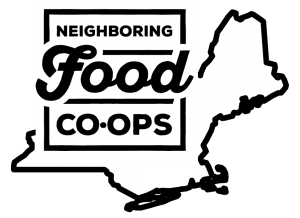
Your Neighboring Food Co-ops
Locally Owned by More Than
164,000 People Like You!
- Northeast Organic Family Farm Partnership
- Take Action! Capital for Co-operatives Act
- Co-op Education: Language Matters
- Co-op Jobs!
- January’s Cave to Co-op Artisan Cheese
- Blåbärssoppa!
- Partner Profile: ECRS
- Farmers Union Annual Meeting
- Co-op Calendar
Northeast Organic Family Farm Partnership
Neighboring Food Co-op Association joins Farm Partnership to help save 135 Northeast Organic Dairies.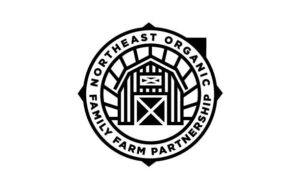
Last fall, 135 organic family farms across Maine, New Hampshire, Vermont, and eastern New York received the sudden news that Horizon and Maple Hill Creamery were terminating their purchase contracts, effective in early 2023. This news put these farms, many of whom have been in business for generations, at serious risk of closure unless they find alternate outlets. In early January, the Northeast Organic Family Farm Partnership, a first-of-its-kind campaign in partnership with the Maine Organic Farming and Gardening Association (MOFGA), was created to help solve the crisis of disappearing family farms in our region.
The Partnership, a collaboration of farmers, processors, retailers, activists, and government agencies, invites consumers to pledge to purchase at least one-fourth of their weekly organic dairy purchases from brands that have committed to increasing their existing purchases from Northeast organic family farmers. A central goal of the effort is to increase demand for dairy produced in our region, creating market stability to help save the 135 at-risk farms and build greater food system resilience for the future.
The Neighboring Food Co-op Association (NFCA), a federation of more than 45 food co-ops and start-up initiatives with a combined membership of over 164,000 people across New England and New York State, is the first retail organization to join the Partnership.
“Food co-ops in our region have been pioneers in building a more resilient and sustainable food system by partnering with local farms and producers,” said Erbin Crowell, NFCA Executive Director. “We’re excited to build on this experience by contributing to this collaborative effort to support family farmers in the Northeast.” As part of this initiative, Crowell is joining the Partnership’s Advisory Board to offer retailers’ perspectives throughout the organization’s growth.
On average, more than 25% of sales at NFCA member food co-ops are sourced from local suppliers, demonstrating a shared commitment to building a more vibrant and resilient regional economy. In 2020, this totaled more than $100 million in local product sales.
The NFCA is encouraging its member co-ops to contribute to consumer awareness by becoming licensed as Retail Partners. To join the Partnership, a retailer must purchase products from at least one Partner Brand and commit to increasing sales of these brands over time. Meeting these criteria should not be difficult for food co-ops who already sell many of the products from these farms, processors, and farmer co-operatives such as Organic Valley. Once signed on as a Retail Partner, food co-ops will be able to display the Partnership Logo at the point of sale and online to enable easy participation in the campaign by consumers. The Partnership, which has already garnered more than 287 million impressions on networks large and small, is also coordinating local press events to drive consumer awareness and traffic to Retail Partner storefronts.
“We’re excited to have the NFCA as an active partner in this effort,” said Gary Hirshberg, Chair of the Partnership and founder and former CEO of Stonyfield Farm. “Everyone has a stake in the long-term financial health of these farms and farm families, and we’re looking forward to the participation of food co-ops from across our region as we work to ensure that these farms will remain healthy, vibrant, and sustainable for generations to come.”
To sign the consumer pledge, become a Retail Partner, or learn more about the Partnership, please visit: https://www.saveorganicfamilyfarms.org. And if your Food Co-op’s Marketing Manager or Dairy Buyer would like to be more involved in planning this effort, please e-mail Suzette Snow-Cobb.
Take Action! Capital for Co-operatives Act
Tell your Senators and Representatives that they can support food co-op start-up, growth & innovation!
Just before Congress returned to their home districts for the holidays, Congressman Joe Neguse (D-CO) introduced the Capital for Cooperatives Act in the House of Representatives. This legislation would require the U.S. Small Business Administration (SBA) to change their existing regulations so that co-operative enterprises can access the agencies affordable financing programs to help small businesses start-up, expand and innovate. Specifically, the bill would ensure the changes do not require a personal or entity guarantee from the co-operative.
“Small businesses are the heartbeat of our economy. Yet, far too often bureaucratic measures are keeping them from accessing the resources and support they need to grow and thrive,” Rep. Neguse said. “The Capital for Cooperatives Act will address one such roadblock, so that more people can unlock the funds they need to start or grow their co-operative businesses.”
Earlier in 2021, Colorado Senator John Hickenlooper introduced a similar measure. “Running a small business is tough. It’s tougher when federal resources overwhelmingly go to a select group of people, businesses, and places,” said Hickenlooper. “We must break down barriers that diverse businesses and businesspeople face and that’s exactly what these bills do.”
More than 300 co-ops and other organizations have endorsed the Capital for Cooperatives Act, and you can add your group’s name at this LINK.
You can also reach out to your Representatives and Senators and ask them to cosponsor the Capital for Cooperatives Act. Contact your U.S. Representatives by House.gov and entering you zip code. You can find your U.S. Senators by visiting senate.gov and selecting your state in the ‘Find your Senators’ dropdown box in the upper left corner of the site.
Here is a sample message to ask your elected officials to cosponsor the bill and feel free to modify the message as appropriate:
“Dear Senator/Representative ________,
I am writing today as a member of [CO-OP NAME] in [CITY/STATE] to urge you to cosponsor the “Capital for Cooperatives Act” (S.1736/H.R.6317), introduced by Senator John Hickenlooper and Congressman Joe Neguse. This bill would require the U.S. Small Business Administration (SBA) to update agency regulations to ensure co-operative enterprises can equitably access SBA capital programs to startup and grow our small businesses. You can view the more than 300 business and lending organizations that have endorsed this legislation at https://ncbaclusa.coop/support-the-capital-for-cooperatives-act/.
One in three Americans is a member of at least one co-op in the United States and co-ops account for approximately 65,000 establishments. Here in the Northeast, more than 164,000 people from all walks of life are members of over 40 food co-ops and startup initiatives. Together, these businesses generate $384 million in revenue and employ 2,400 people. Food co-ops reinvest into the community at higher rates, source more than 10 times the amount of locally-made products, and create more jobs than conventional supermarkets.
Unfortunately, SBA has maintained regulations that prohibit co-operatives such as these from accessing the affordable capital offered through programs like the 7(a) loan guarantee program. Changing these regulations will be an important step toward leveling the playing field for co-ops and spurring economic growth.
Co-operative enterprise is a proven business model that empowers people from all walks of life and create sustainable, inclusive economic growth. Access to capital is imperative for co-ops to start-up, grow, and continue to meet the needs of their members and communities. This need will only be more significant as communities across the country seek to recover and rebuild in the wake of the COVID-19 pandemic, and that is why I ask you to cosponsor the Capital for Cooperatives Act today.
Thank you!”
This article was adapted from content provided by the National Cooperative Business Association, CLUSA International. As part of our partnership and effort to grow the co-operative economy, NFCA Member Co-ops are invited to join NCBA CLUSA at a special discount. Please contact us for more information.
Co-op Education: Language Matters
The language we use to describe how our co-operative operate is an opportunity to engage people in what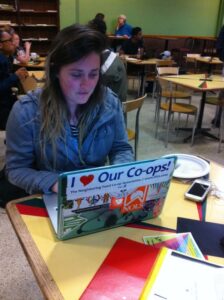 makes our model unique.
makes our model unique.
As a lecturer at the University of Massachusetts, I find that the first few weeks of my class on the co-operative movement usually involve discussion of the meaning of a few basic words.
A co-op is a business, so why are we talking about “membership?” Aren’t businesses owned by entrepreneurs or investors? What is “patronage” — and why does it matter? If the profit motive is the engine of our economy, what is “surplus” or “net savings”?
I was reminded of this recently as I came across a pamphlet titled “Learning the Language for Study and Action.” Originally published in 1940 by the Cooperative League of the USA (now the National Cooperative Business Association) and revised in 1971, the Introduction is surprisingly relevant: “Business mergers are widespread; economic power is highly concentrated,” the authors note. “Can we really have much free enterprise in our country if the average citizen doesn’t know what’s going on?”
Co-ops began as a grassroots economic movement with a focus on economic literacy. In keeping with this history, education remains a basic principle of the International Co-operative Alliance’s (ICA) Statement on the Co-operative Identity, which affirms that coops must work to “inform the general public — particularly young people and opinion leaders — about the nature and benefits of co-operation.”
Today, the co-op business model is enshrined in our state laws, providing a legal framework to empower people to work together to meet their needs. From farmer co-ops to food co-ops, worker co-ops to credit unions, housing co-ops to artisan co-ops, there are an estimated 40,000 co-operatives in the US, active in all aspects of our economy.
A central challenge for co-ops, however, is that students do not generally learn about them in our schools, colleges, and universities — much less our business schools. As a result, co-op education must begin with the terms we use to describe co-operative enterprises and how they operate.
On the other hand, this is also an opportunity. Learning a new language offers new ways of seeing the world, and the words that we use to talk about economics are no different. In this sense, co-op terminology is best seen as a tool for communicating what makes this business model unique.
For example, “membership” in a co-op usually involves the purchase a member share. This makes you a joint owner of the enterprise — but only in a collective sense. This share is a capital contribution as opposed to an investment as it is not linked to a financial return. It can also be difficult to communicate that this share cannot be sold and does not give a member individual property rights or any individual control over the business as a sole proprietor has. Rather, membership confers on the holder specific benefits as a “user” of its products and services, and a role in the democratic governance of the enterprise.
“In essence, membership means that there should be a special relationship between the co-operative and the people whose needs it is established to serve,” reads the ICA’s Guidance Notes on the Co-operative Principles. “Cooperatives are user-driven organizations… established by, owned by and operating to meet their members’ common economic, social and cultural needs and aspirations.”
Co-ops are best described as not-for-profit enterprises, as opposed to for-profits or non-profits, in that they are designed to operate at cost, generating sufficient profit to meet member needs and goals rather than maximizing returns for investors. (Co-ops may have investors but they have no vote in the business and their financial return is limited.) Any money left over at the end a given year — in basic terms, the difference between income and expenses — is often described as “net savings” or “surplus,” or what conventional businesses call “net profit.”
So, why not just use conventional business terms? The authors of Learning the Language point out that surplus is “not true profit, to be paid to the absentee owners of invested capital. In a co-operative, it is ‘savings’ to be returned to active user-owners, in proportion to their use of the business — or used to strengthen their co-operative.” Therefore, the words that we choose are an opportunity to help “educate members and the public to understand co-op principles and objectives.”
This brings us to “patronage.” In contrast to conventional businesses, ownership of a member share in a co-op does not entitle the member to a financial return. Rather, as “patrons” or “users” of their shared enterprise, members receive an economic return in the form of desired products, services, and/or employment. They also receive social returns such as stronger communities, sustainable food systems, and more stable local economies, in keeping with the policies that they help establish.
Any financial resources left over at the end of a given fiscal year are reinvested in the co-operative to improve these services or expand the business or returned to members as “patronage rebates” or “refunds.” In contrast to an investor-owned business, in which profit is distributed based on how much capital is owned, a co-op may return a portion of its “surplus” to it members on the basis of their patronage, or use of its products and services. In a consumer co-op, this means a member’s purchases; in a producer co-op, the amount of product processed and marketed through the business; and in a worker co-op, the labor contributed to the business. (To make things even more interesting, “multistakeholder” or “solidarity” co-ops can have a variety of member types with different “patronage” relationships to the enterprise.)
Language matters, demonstrated by the fact that in many states, it is illegal to include the term “co-op” or “co-operative” in the name of a business unless it is incorporated as such and operates in keeping with co-operative statutes. The words we use can also play a powerful role in empowering people to envision a better, more participatory, and inclusive economy:
“How can we restore democratic control over American business if the people themselves do not understand business?” the authors ask in Learning the Language. “We need millions of Americans who understand corporate business. And where can an American gain better training than belong to a co-operative…? Indeed, it’s almost the only way many Americans ever get a practical business education.”
Erbin Crowell is Executive Director of the Neighboring Food Co-op Association. He received his Master of Management: Co-operatives & Credit Unions from Saint Mary’s University in Nova Scotia and serves on the Boards of Directors of NCBA CLUSA and the Co-operative Management Education Co-operative (CMEC). This story was adapted from an article originally published in Green Living Journal, Spring 2018. Click HERE to download a PDF.
When you work at your local food co-op, you’re part of something bigger: You’re also helping to grow a more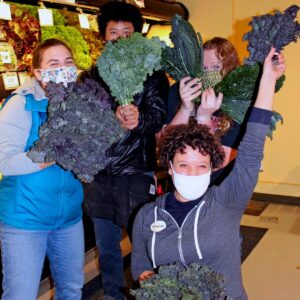 healthy, just & sustainable food system that works for everyone!
healthy, just & sustainable food system that works for everyone!
Want to develop new skills, advance your career, and do meaningful work for a business that makes a difference in your community? Come join the co-op team!
From our beginnings, co-ops have been guided by a commitment to shared values of democracy, equality, equity, and solidarity. And across our region, food co-ops have been pioneers in healthy food, sustainable agriculture, and building a more inclusive economy that works for everyone.
And working together, we are increasing our impact. Our food co-ops are locally owned by over 164,000 members, generate annual revenue of more than $382 million, and sell more than $100 million in local products. We also sustain good jobs in the community, employing 2,460 people – 65% of whom are also members, sharing in the ownership of their food co-ops.
Not only is working at your local co-op truly meaningful, it’s also fun working with others who also want to help build a better world. We’d love for you to be part of our co-op community and work to build a more healthy, just, and sustainable food system and a more inclusive economy.
Get more info and to help spread the word: https://nfca.coop/co-opjobs.
January’s Cave to Co-op Artisan Cheese
Pawlet, Consider Bardwell Farm, West Pawlet, VT.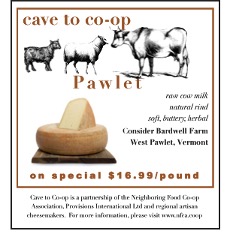
Pawlet is an Italian-style mountain toma made from raw cow milk and aged five to six months. Flavors are mild, buttery and rounded, with hints of flowers, grass and savory herbal notes. A natural rind and creamy texture with a bright bite, makes this a great sandwich cheese or an appetizer with for a great cheese board. It is a versatile cheese, like its namesake. The farm’s use of slate, syrup, and timber all are sourced from within the town of Pawlet.
Consider Bardwell Farm in West Pawlet Vermont is a producer of award-winning handmade cheese. Spanning the rolling hills of Vermont’s Champlain Valley and easternmost Washington County, New York, 300-acre Consider Bardwell Farm was the first cheese-making co-op in Vermont, founded in 1864 by Consider Stebbins Bardwell himself.
In the late 1860s, the farm changed hands. The Nelsonville Cheese Factory purchased the property, where they continued the same service that Bardwell had started until the late 1930s, when the Great Depression brought it all crashing down.
A century later, Angela Miller and Russell Glover, with the help of cheesemaker Peter Dixon, revitalized the tradition of cheesemaking on the farm. After years of both accolades and changes – today’s line up of cheeses are made using the milk from neighboring Indian River Farm to craft cheeses that are both friendly enough for everyone but nuanced enough for the discerning palate.
Pawlet is the perfect melting cheese, excellent in a grilled cheese or melted in a baked potato. These cold winter evenings are the perfect time to try Pawlet with polenta.
Creamy Polenta with Pawlet — Serves 6
- 4 cups of milk
- 2 cups of water
- 1 ½ teaspoons salt
- 2 cups of instant polenta
- 2 tablespoons unsalted butter
- 4 ounces grated Pawlet cheese
- extra grated Pawlet for serving
Bring the milk and water to a rolling boil in a large heavy saucepan. Add the salt and gradually pour in the polenta, stirring constantly. Continue stirring and cook for 3 to 5 minutes until the polenta thickens and pulls away from the sides of the pan. Remove from heat and stir in the butter and cheese. Serve with a bowl of extra grated Pawlet at the table.
This polenta can also be poured into a buttered pan and cooled until solid. When cool, remove from pan and slice as desired. Sauté the slices of polenta in butter until crisp and golden. Serve with a simple tomato sauce and extra cheese.
You can also slice the cool polenta and layer it in a casserole dish with any type of pasta sauce, vegetarian or with meat, much like lasagna. Or use slices of polenta to top a casserole, much like shepherd’s pie.
Each month our Cave to Co-op partnership between Provisions International and the Neighboring Food Co-op Association (NFCA) offers a delicious regional cheese featured at a great price. Strengthening our local and regional farmers and producers by supporting artisanal cheesemakers is a key goal of the Cave to Co-op program.
Blåbärssoppa & Diet for a Small Planet
 and is known for being served during Vasaloppet – the world’s oldest, longest, and biggest cross-country ski race that takes place in Sweden. Even if you are not out trekking in the snow but would like to enjoy a warming, tasty, easy to make soup give Blåbärssoppa a try!
and is known for being served during Vasaloppet – the world’s oldest, longest, and biggest cross-country ski race that takes place in Sweden. Even if you are not out trekking in the snow but would like to enjoy a warming, tasty, easy to make soup give Blåbärssoppa a try! m the Neighboring Food Co-op Association at your local co-op!
m the Neighboring Food Co-op Association at your local co-op!ECRS provides a front-to-back retail automation solution suite built with a class-leading technology platform.
As the leading point of sale system provider to food cooperatives in the United States, ECRS maintains a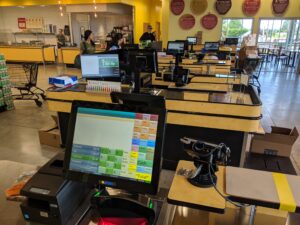 value-focused, customer-centric approach. Our solutions are ideal to handle the unique nature of food co-op grocers. Because we value community engagement and partnership, ECRS is uniquely positioned to add value in thought leadership to partner organizations and individual retailers. ECRS is proud to work alongside NFCA to support New England area co-ops, partnering on numerous startup projects, and developing programs facilitating features such as Double Up Food Bucks.
value-focused, customer-centric approach. Our solutions are ideal to handle the unique nature of food co-op grocers. Because we value community engagement and partnership, ECRS is uniquely positioned to add value in thought leadership to partner organizations and individual retailers. ECRS is proud to work alongside NFCA to support New England area co-ops, partnering on numerous startup projects, and developing programs facilitating features such as Double Up Food Bucks.
ECRS is an established food and beverage retail solutions provider serving over 4,000 retail locations across North America. ECRS’ revolutionary CATAPULT® system is the industry’s only truly unified point of sale platform. With CATAPULT, the point of sale, self-checkout, e-commerce, inventory, customer loyalty, member management, back office, and enterprise management all share a single transactional logic, called Unified Transaction Logic™. This business logic empowers our retailers by providing actionable business intelligence across the operation. Unifying hardware, software, and services, ECRS offers a holistic retail solution that will increase engagement and improve the consumer experience.
ECRS is committed to perpetual development, expanding value through constant innovation. To that end, CATAPULT is fully-configurable. Optional plug-and-play modules work seamlessly with core applications, offering co-op retailers freedom and flexibility in designing their point of sale platform. Retailers can easily expand platform functionality as their business grows. Exhaustive research, intelligent design, and rigorous pre-market testing ensure that ECRS products integrate smoothly into existing retail environments. And a commitment to partner engagement ensures those products are the solutions retailers need to stay ahead of the game.
Join us for our Annual Meeting to hear from National Farmers Union President Rob Larew, our achievements in 2021, and looking forward to the coming year! 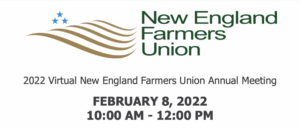
New England Farmers Union is a membership-driven organization that is committed to enhancing the quality of life of family farmers through educational opportunities, co-operative endeavors and civic engagement. Be part of the solution and become a Farmers Union Member today — and join us for our online Annual Meeting on February 8, 2022!
New England Farmers Union is a grassroots organization that works to protect the social and economic well-being of family farmers throughout New England. Our membership is as diverse as the agricultural landscape in New England and includes grain farmers, vegetable growers, fruit growers, livestock farmers, and dairy farmers. All of our members play a role in bringing the issues that matter most to lawmakers in New England and fighting for their rights as family farmers.
New England Farmers Union has been the voice of family farmers, rural residents and consumers across the region since our founding. We believe the needs of New England’s farm economy are every bit as important as the policy priorities of Wall Street and Corporate America. We are the dedicated voice of family farming, and we aim to preserve a sustainable economy that benefits each of us where we live while providing domestically grown, healthy choices for consumers.
If you are a family farmer or rural resident dedicated to preserving your way of life. If you are a consumer and you believe it’s important to buy locally from someone you know and trust. If you represent a business that believes in sustainability and want to see an economy that works just as well for the little guy as it does for the big guy. If you are concerned about any of these issues, then we invite you to join New England Farmers Union. We work every day to further all of these priorities and many more.
For over ten years, the New England Farmers Union has partnered with the Neighboring Food Co-op Association (NFCA) to support the success of our family farmers and fishers, advocate for agricultural policies that strengthen our regional food system and grow the co-operative movement. Please consider joining today — and remember to join us for the online Annual Meeting on February 8, 2022!
Our Local Farmers & Fishermen Need You!
Do you care about where your food comes from and want to support the people who produce it? Join the NEFU as a Friend of the Farmer for just $15. Your membership will help ensure that our region’s producers and consumers are heard by policy makers here at home and in Washington, DC. For more information, please visit www.newenglandfarmersunion.org.
Our 40th annual Winter Conference, Dream Into Being, is an invitation to pause, collectively dream the agricultural future we long for, and learn together about seeds to plant today to grow the fruits of tomorrow. Each year, the NOFA-VT Winter Conference provides a valuable opportunity for farmers, homesteaders, gardeners, land managers, educators, students, producers, policy-makers, and other food-system activists to participate in our vibrant community event by sharing ideas, resources, and skills. It is a time to celebrate, gather, and connect over the winter. Sponsored by the Neighboring Food Co-op Association.
For More Co-op Events, Visit https://nfca.coop/calendar
The Neighboring Food Co-op Association (NFCA) is a co-operative federation of over 40 food co-ops and startup initiatives across New England, working together toward a shared vision of a thriving co-operative economy, rooted in a healthy, just, and sustainable food system and a vibrant community of co-operative enterprise.


